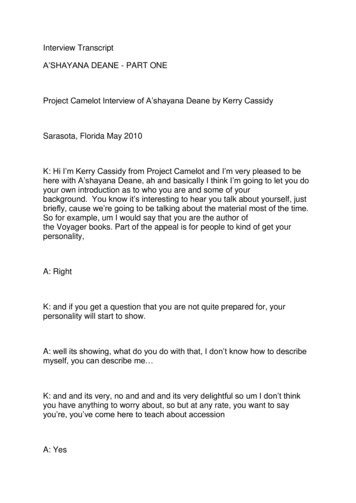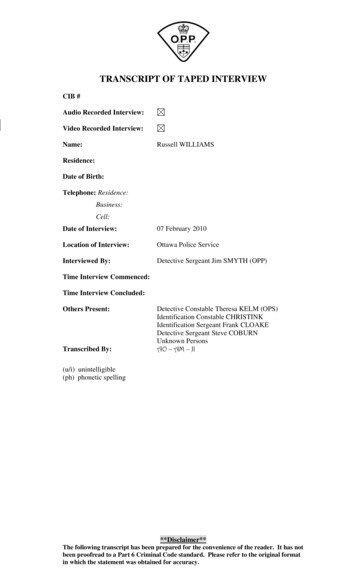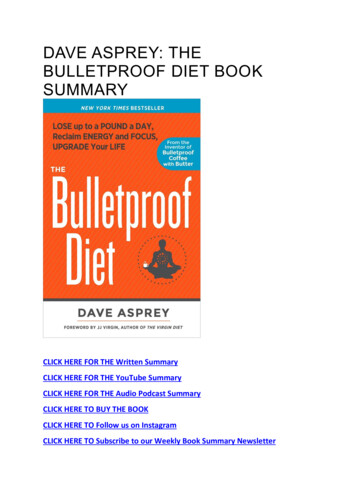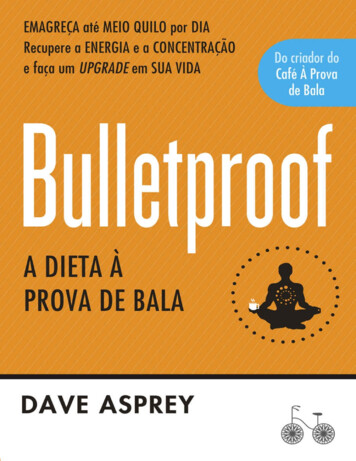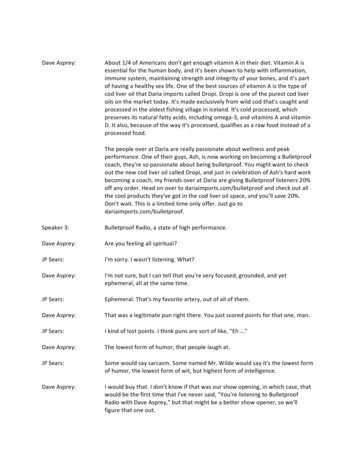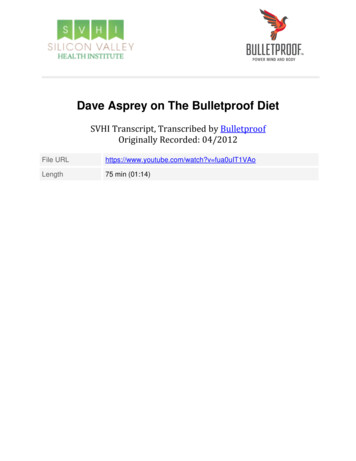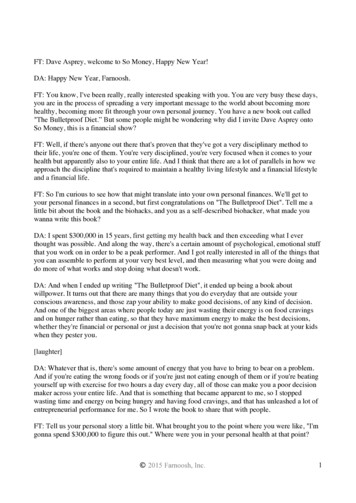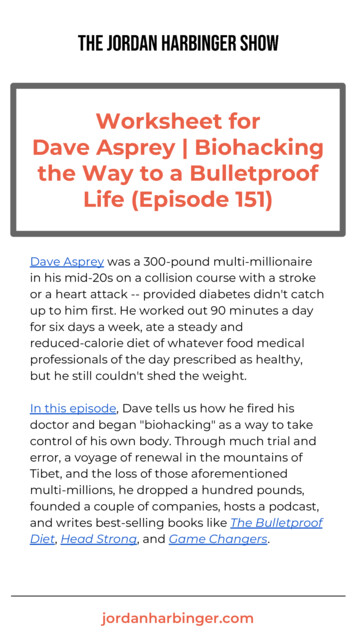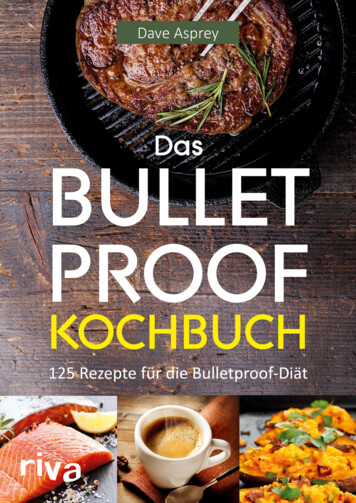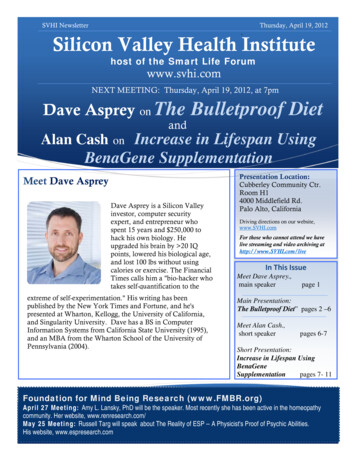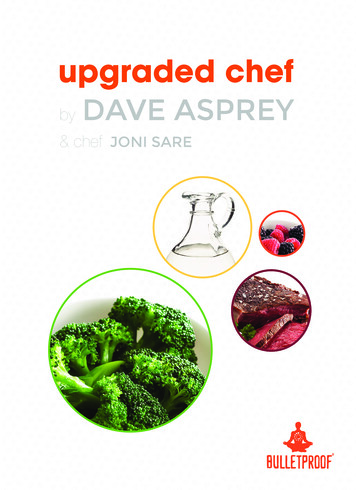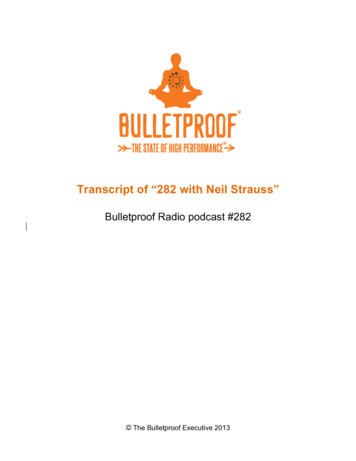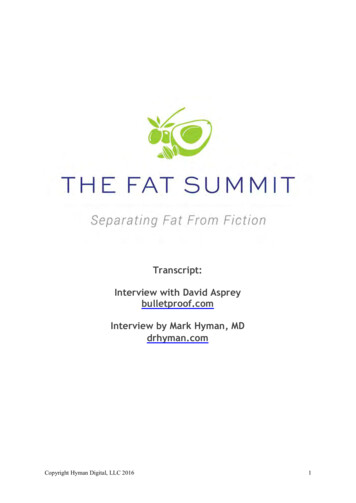
Transcription
Transcript:Interview with David Aspreybulletproof.comInterview by Mark Hyman, MDdrhyman.comCopyright Hyman Digital, LLC 20161
Dr. Hyman: Hey, everybody. This is Dr. Mark Hyman. Welcome to The FatSummit where we separate fat from fiction, and I've got my good friend andbrilliant bio-hacker here, Dave Asprey who I've known for many years, and hasinspired me with his work. He's the Founder of Bulletproof and author of TheNew York Times bestseller, “The Bulletproof Diet,” which I actually read, andis a great book. He's a Silicon Valley investor, a technology entrepreneur. Hespent decades, and get this, he spent over 300,000 biohacking his own biologyto figure out what works, to get healthy and lose weight, and feel good. And it'snot only about actually just getting rid of disease. He's actually about optimizing human performance, which is actually pretty cool.He's the creator of the widely popular Bulletproof Coffee, which you mighthave heard about, read about in The New York Times. He's the host of the #1health podcast, Bulletproof Radio, which I've been on, and you can go watchthat if you want. He's the author of this New York Times bestselling book, “TheBulletproof Diet,” and he just is an amazing resource on techniques, keys, strategies and how to take control of your biochemistry, your body and your mind,so they all work together and they help you perform at super high levels. Without burning out, without getting sick or all under stress to cloud your mind oryour decisions. So welcome, Dave, to The Fat Summit.Dave: Mark, it's an honor to be on and it's a pleasure to see you, again.Dr. Hyman: It's good to see you, too. So we're going to get into it today. We'regoing to get into all these topics because you are out there on the edge. You areriding this wave of fat, all the way into the culture, which is transforming howwe think. And it's on the heels of a lot of research that's been questioning ouravoidance of fat, and our fear of fat, and fat is a four-letter word, which cameout of the food pyramid and the dietary guidelines in the early 80s, whichCopyright Hyman Digital, LLC 20162
shunned fat and promoted carbs and sugar. Which we ate 6 to 11 servings ofrice, bread, pasta, and cereal every day recommended by the government, thankyou very much.So now we've shifted away from that, but you've gone even more extreme. It'snot only avocados and almonds and olive oil. But you're talking about, God forbid, butter and not only butter, but have butter every day in your coffee andhave coconut fat, which is MCT oil, which is saturated fat. In fact, that's 90%saturated fat and butter's only 50%.So these are ideas that are really out there on the edge, and to tell you the truth,even for me. I've been so indoctrinated that saturated fat is bad and that butter isbad, I cringe a little bit when I put butter on something. Because, even though Iintellectually think it’s okay, there's a part of me that's like, "Is this reallyokay?" So tell me about your journey. How did you get to be a biohacker? Whyis it important to be a biohacker and what is hacking anyway?Dave: All right, let's start off with what hacking is, and then I'll talk about biohacking, and we'll get into the journey.Dr. Hyman: I know it's going to be about butter.Dave: Hacking is what I used to do for a career. I was a Silicon Valley engineering guy. The last job that I had, before I surprisingly became a full-timeblogger and call me a fat evangelist, is I was the Vice-President of the largestinternet security companies. And the whole thing that you do in technology inhacking isn't about your stealing stuff or anything like that. It's about takingcontrol of the system that you're not supposed to have control of.Copyright Hyman Digital, LLC 20163
And biohacking is the art of changing the environment around you and the environment inside of you, so that you'll have control of your biology. You're notsupposed to have control of your biology and thinking about your biologydoesn't make it change very much. But when you decide to tell the worldaround to talk to your body, your body listens to the world around you morethan it listens to you. So let's go that way, because, hey, that's how you hack it.Dr. Hyman: Right. So you figure out how to have your body listen to signalsfrom the outside that you can change. You can change your environment. Youcan change your diet. You can change your thoughts. You can even changeyour brain. I heard about something you did with a friend of ours which is like40 years of Zen where you get.Dave: With AJ?Dr. Hyman: .40 years of meditation in one week. I'm like, "I want to sign upfor that." It sounds too good to be true. But there are all these strategies for getting pathways into optimizing our biology and that's what Functional Medicineis. It's really the science of getting healthy. It's the science of actually understanding, at a deep level, how the body functions, that dynamic system, and optimizing those systems to not only get rid of disease, but actually to perform at amuch higher level, which is really what we all would love, right? Because itfeels good; you'll be energetic, focused. To feel all of our feelings, to have ourbody work properly. To not have pain, to sleep well, to feel good, I mean that'swhat we all want, and we don't think that's accessible. We are saying, "Hey,guys. It is accessible."Dave: That whole long list you just mentioned, I didn't have any of that.Copyright Hyman Digital, LLC 20164
Dr. Hyman: Yeah, yeah. What's your story, man? You were a big guy, right?Dave: Yeah, I used to weigh 300 pounds, and if you look, I'm reasonably strongand lean and stuff, and that was in my mid-20s. I was obese as a teenager and Ijust kept putting on weight, and like all fat people, I actually knew that I wasfat.Dr. Hyman: And so it wasn't a surprise.Dave: It wasn't, like, I was just in denial, and there might have been some emotional eating in there. But there was a lot of willpower and I said, "All right, I'vehad three knee surgeries and I'm 23 years old, and I don't like it that I'm this fat.I have stretch marks. The most important thing in my life is to get rid of thisstuff." So I went to the gym and I went to the gym an hour and a half a day.Half cardio, half heavyweights, six days a week, I cut fat out of my diet. I cutmy calories down to around 1800 calories a day, and do you know what I got?I got strong and still fat. I could max out all the machines at Nautilus. I couldbench press all my friends, and all my friends ate French fries and cheeseburgers, and I ate this salad with a chicken breast, and no dressing. One day I justlooked around and I said, "Do you know what? It's not that I'm weak. It's notthat I didn't even deny myself even more. It's just that this doesn't work. I giveup. It's not okay."But because I'm a hacker, hackers don't give up. We just find another way and Istarted looking around, and I started trying every diet. In fact, I've been a rawvegan for quite a while actually, which works great for the first three months,and then wrecks your health for the time after that. In fact, there's a lot of recovering vegans on the Bulletproof Protocol because of that.Copyright Hyman Digital, LLC 20165
Dr. Hyman: Yeah, I wanted to get into that. Because that's a very good pointfor you to bring up about vegan, and what you're doing, and the conflicts, andchallenges, yeah.Dave: So the whole idea there was that, "All right, if what I've been told works,doesn't work, what am I going to do?" Well, you look at research, and my firstbook had 1,300 references in it, and it was how the environment changes geneexpression, and what you can do that makes you strong and makes you weak.That book was actually about pregnancy. Like, what do you do to have healthier kids? And my second book, “The Bulletproof Diet” was about biologicaltestosterone replacement. Because when I was maybe 28-29, I had, let's see,less testosterone than my dad and more estrogen than my mom.Dr. Hyman: Yeah, that's not a good thing.Dave: No, I'm not functioning well.Dr. Hyman: That's funny. That's what I say when men and women, talkingabout sugar, is the men grow breasts, lose the hair on their bodies, and have nosex drive, and their testosterone goes down. And the women actually get moretestosterone, and they get beards, and lose hair on their heads, so they lookabout the same.Dave: It's totally true. In fact, I still have my man boobs from when I wasobese. They're smaller, but they're still there because the tissue grew, right? Isuppose if I was really vain, I'd go for surgery or something. But I'm prettyhappy that I have a six-pack, and stretch marks that are also still there fromCopyright Hyman Digital, LLC 20166
when I was obese, but the idea that you can be 100 pounds less fat than youwere before, for most people it seems unachievable.Dr. Hyman: So you lost 100 pounds?Dave: Yeah, a full 100 pounds, which is almost unimaginable. And for aboutfive years after I lost it I would be in a hallway. I would turn sideways. BecauseI would think there wasn't room for the person to walk past me because I wasused to having such a big bulk around me. Now actually in my mind, I knowhow big my body is. But it changed my energy level so much. I was still, however, even after I lost a lot of the weight, I was taking smart drugs.Dr. Hyman: And you did it by eating a lot of fat is what you're saying?Dave: Yeah, I absolutely did it by eating a lot of fat. But I hadn't been eatingquite as much fat as I eat now. I found out when I raised the fat, I felt better.But like you, I was running an anti-aging nonprofit research group. I talked toexperts on fat. I read all these studies. I looked at the effects of grass-fed butterversus regular butter versus canola oil or something, which is just bad news andI said, "All this science tells me I should be able to eat a lot more butter andwhen I do, it's like someone takes the gloves off." I feel more vibrant. I havemore of that core energy.So I decided that I was going to do an experiment, and I was going to increasemy calories dramatically. I was going to eat mostly fat and some vegetables,and a moderate amount of grass-fed meat, and basically The Bulletproof Dietprinciples. When I started this I was, "All right, I'm really concerned, I've beentold butter kills you." It's just a lie. So what I did is I tracked my parameters, myCopyright Hyman Digital, LLC 20167
markers of inflammation and inflammation kills you. Fat doesn't kill you, although hydrogenated fat will cause inflammation that will kill you. Canola oil.Right, although there's a whole group of people who thinks that saturated fat actually causes inflammation. I want you to talk about that.Dave: A whole group of people where saturated fat does cause inflammation?Dr. Hyman: Yeah.Dave: You're talking about hypercholesteremic?Dr. Hyman: No, if you look at the literature that's one of the concerns aboutfat. That it increases arachidonic acid, inflammation. Increases all the inflammatory eicosanoids which is the inflammatory cytokines or messenger molecules. So there's concern about that.Dave: There is concern about inflammation that comes from any kind of fat.The problem is that when you look at saturated fat, one of the things that I thinkis largely missed is in what condition is the fat when you eat it? Even the ideaof saturated fat is a little bit of a misnomer because there are many kinds of saturated fat and they all do different things in the body. So one of the things thatisn't well known and this comment's sort of a Reader's Digest version of nutrition is, "Fat is good or fat is bad," but the same could be said for protein orsugar. In fact, let's talk about protein for a minute and we'll generalize it to fat.If, Mark, I said, "You need to have 30 grams of protein," you'd say, "Oh, allright. That's fine." And if I gave you a bowl of scrambled eggs you'd probablysay, "Great," and if I gave you bowl of spider venom you'd say, "I'm not eatingthat," but it's all protein, right?Copyright Hyman Digital, LLC 20168
Dr. Hyman: Right.Dave: So different proteins do different things, like, radical thought, right? Thesame is true of fat. Palm oil contains palmitic acid which escorts toxins fromthe gut into the body, into the brain, and gives you brain fog. So too much palmitic acid or bad bacteria or the combination of those could be bad. But anotherkind of fat that's fully saturated, like, say the stuff that I use in Brain Octane which is a subset of MCTs - it's technically saturated. However, it doesn't evengo into the liver. It's used as energy. So the idea that fat does something, it's soold-fashioned.Dr. Hyman: Fat is not fat.Dave: Right, it's the same with air.Dr. Hyman: It's the quality of the calories. It's not just the type of.Dave: Yeah, and if you're breathing air okay, that's good. But air is a gas. Soyou can say, "Is gas good for you or is gas bad for you?" Well, if you breathethe wrong kind of gas, it kills you. If you breathe the right kind of gas, then yousurvive. So fat doesn't mean anything until we talk about, "Did you damage thefat by heating it? Did you damage it with chemicals and solvents? Is it contaminated with something else?" And once you've sorted those out, then you get intothe real science of fat, and this is just ignored in mainstream media.Dr. Hyman: Right, right. What happens to it? Exactly. When you mentionedpalmitic acid, which is interesting because a lot of palmitic acid is produced inthe body from eating carbs.Copyright Hyman Digital, LLC 20169
Dave: In fact, it's the only saturated fat we can produce onboard, right?Dr. Hyman: Right, and that's what's associated with heart disease, is the saturated fats that come from eating carbs in your blood, which is kind of confusing. You think if you eat saturated fat, it raises the saturated fat in your blood,but it really doesn't. It's actually sugar and carbs that raises satura
brilliant bio-hacker here, Dave Asprey who I've known for many years, and has inspired me with his work. He's the Founder of Bulletproof and author of The New York Times bestseller, “The Bulletproof Diet,” which I actually read, and is a great book. He's a Silicon Valley investor, a technology entrepreneur. He spent decades, and get this, he spent over 300,000 biohacking his own biology .
